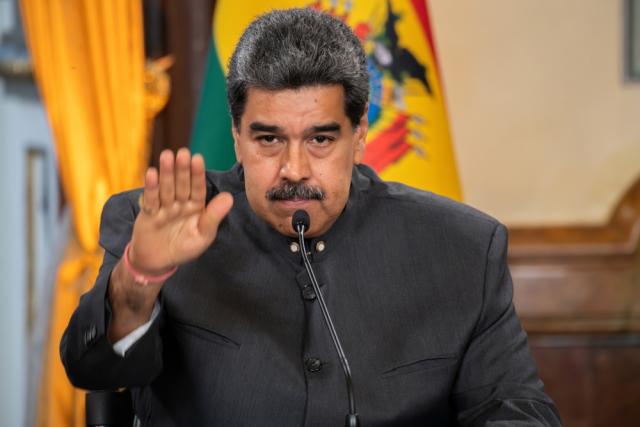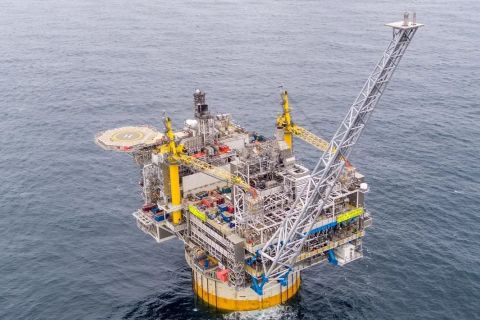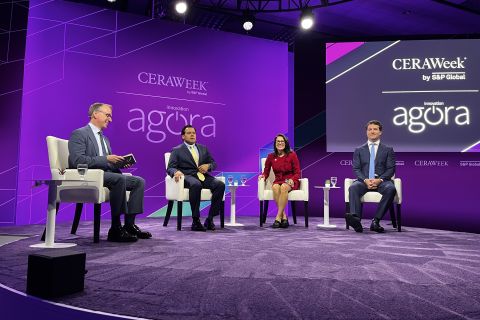
Venezuela’s President Nicolas Maduro. (Source: Shutterstock)
The U.S. government relaxed sanctions on Venezuela’s oil industry for a half year—a move that analysts said could open the door to reintegrating the South American country’s production with international markets, analysts said.
Washington’s policy shift places pressure on Venezuela’s government to enact democratic reforms—the reason U.S. sanctions were imposed in 2019—in order to extend the limited-time reprieve.
The U.S. Treasury Department’s Office of Foreign Assets Control (OFAC) issued a general license on Oct. 18 that authorizes some transactions related to Venezuela’s oil and gas industry. While analysts viewed the move as a positive for the country, they said any impactful increases in oil production would require substantial investments over multiple years.
“This is great news, but the expiration date of this license is only six months,” ChemStrategy Director Ruben Perez told Hart Energy. “For the level of investments and work that is needed in Venezuela’s oil industry, it is not enough time.”
Perez, who is also a director with the Venezuelan Gas Processor Association (AVPG), views Washington’s decision as a gesture of good faith.
Perez said the license could benefit Chevron Corp. and other companies that have active production, but other companies are unlikely to take advantage due to the limited window OFAC has opened for Venezuela.
The relaxed sanctions could allow state-owned Petroleos de Venezuela S.A. (PDVSA) to sell its oil at higher prices to other clients and eliminate discounted sales to Asian clients, Perez said.
Venezuela’s oil production averaged 733,000 bbl/d in September 2023, according to secondary source data from OPEC’s Monthly Oil Market Report. Venezuela’s current production is up from a low of around 500,000 bbl/d in 2020—but still a far cry from its 1997 peak of about 3.2 MMbbl/d.
“It is evident that the general license will not generate a substantial increase in oil and gas production and exports in the short term,” Datanalisis President Luis Vicente León said Oct. 18 in a post on X, formerly Twitter. “But it will begin a process of fundamental growth and investment to rescue Venezuela's presence in the international market.”
León said the OFAC license was a broad-spectrum that would permit Venezuela to conduct oil and gas operations and permits some financial transactions that have been prohibited since sanctions were first enacted.
“This is a giant step in terms of the country's reintegration into the international market, at a time when our country and also the Western world need it most,” said León, who heads Venezuela’s top polling consultancy.
RELATED
Is Venezuela the New Iran? Sanctions, Elections Weigh on Oil Powerhouse
Q&A: US Sanctions Ravage Venezuelans as Democracy Withers [WATCH]
Democratic reforms or else
OFAC’s decision to ease sanctions came after Venezuelan officials signed agreements on Oct. 17 in Barbados to give certain guarantees related to presidential elections in 2024. A separate gas deal was also signed on Oct. 17 involving Trinidad and Tobago.
Hamas’ attacks on Israel in recent weeks brought back concerns of a prolonged armed conflict in the Middle East that could escalate and disrupt oil and gas in the region. That uncertainty, coupled with other geopolitical events, means demand for U.S. oil will remain high for now, according to analysts.
León said Washington’s plan was “infinitely more intelligent than the initial sanctions and places the pressure of political negotiation and respect for the constitution as a condition for renewing it in six months.”
“This has a real and concrete capacity for influence and will undoubtedly have impacts on politics in 2024,” León said, referring to Venezuelan presidential elections slated to take place in the second half of 2024.
“With the signing of these agreements, we are taking the first step towards the full lifting of all sanctions, the progressive recovery of social well-being, economic growth, the consolidation of peace and democracy, within the framework of full sovereignty and national independence,” Venezuela’s President Nicolas Maduro said Oct. 18 during a broadcast on national television.
Maduro’s government also announced the release of political prisoners Roland Carreño, Juan Requesens, Marco Antonio Garcés Carapaica, Eurinel Rincón and Mariana Barrero, according to details revealed by Venezuelan lawyer Gerardo Blyde on X.
“[Washington] is giving a premium to the kid [Maduro] that behaves badly so that [the kid] behaves good,” Perez said.
License details
OFAC’s General License No. 44 authorizes transactions involving PDVSA or any entity in which it owns, directly or indirectly, a 50% or more interest, according to an Oct. 18 OFAC statement. The license expires on April 18, 2024.
The license allows for the following:
“Production, lifting, sale and exportation of oil or gas from Venezuela, and provision of related goods and services; payment of invoices for goods or services related to oil or gas sector operations in Venezuela; new investment in oil or gas sector operations in Venezuela; and delivery of oil and gas from Venezuela to creditors of the government of Venezuela, including creditors of PDVSA [and its entities], for the purpose of debt repayment,” according to OFAC.
The license doesn’t authorize transactions with blocked financial institutions other than Venezuela’s Central Bank or Banco de Venezuela SA Banco Universal; provisions for goods or services or new investments by an entity or person located in Russia or any entity owned or controlled by a person in Russia.
Sofia Guidi Di Sante, Rystad Energy senior oil market analyst, said in an Oct. 17 research report that Venezuela’s production could ramp up by a maximum of 200,000 bbl/d over six months once the sanctions were lifted.
RELATED
Rystad: Easing US Sanctions on Venezuela Could Boost Production
Recommended Reading
Tech Trends: QYSEA’s Artificially Intelligent Underwater Additions
2024-02-13 - Using their AI underwater image filtering algorithm, the QYSEA AI Diver Tracking allows the FIFISH ROV to identify a diver's movements and conducts real-time automatic analysis.
Subsea Tieback Round-Up, 2026 and Beyond
2024-02-13 - The second in a two-part series, this report on subsea tiebacks looks at some of the projects around the world scheduled to come online in 2026 or later.
Exclusive: Silixa’s Distributed Fiber Optics Solutions for E&Ps
2024-03-19 - Todd Chuckry, business development manager for Silixa, highlights the company's DScover and Carina platforms to help oil and gas operators fully understand their fiber optics treatments from start to finish in this Hart Energy Exclusive.
CERAWeek: AI, Energy Industry Meet at Scary but Exciting Crossroads
2024-03-19 - From optimizing assets to enabling interoperability, digital technology works best through collaboration.
Cyber-informed Engineering Can Fortify OT Security
2024-03-12 - Ransomware is still a top threat in cybersecurity even as hacktivist attacks trend up, and the oil and gas sector must address both to maintain operational security.






